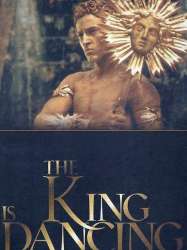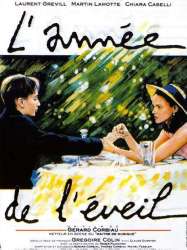Andrée Corbiau is a Scriptwriter and Script Supervisor

Source : Wikidata
Andrée Corbiau

- Infos
- Photos
- Best films
- Family
- Characters
- Awards
Filmography of Andrée Corbiau (4 films)
Scriptwriter

The King Is Dancing (2000)
, 1h55Directed by Gérard Corbiau
Origin France
Genres Drama, Biography, Historical, Musical
Themes Dance films, Films about music and musicians, Politique, Films about classical music and musicians, Musical films, Political films, Histoire de France, Films about royalty
Actors Benoît Magimel, Tchéky Karyo, Boris Terral, Cécile Bois, Johan Leysen, Claire Keim
Roles Writer
Rating68%





Lully (Boris Terral) starts to gain the favour of the 14-year-old King Louis in 1653 by giving him specially designed shoes for Ballet de la Nuit. His subsequent rise draws hostility from the old cadres of the court, particularly the royal composer Cambert (Johan Leysen). However, following Cardinal Mazarin's death, Louis (Benoît Magimel) installs himself in full power as the king in 1661 and he is now at stake with the religious establishment created and controlled by his mother Anne of Austria (Colette Emmanuelle) at the Palais-Royal. On the other hand, Lully's animosity with Cambert comes to a novel dimension after Cambert's mistress Madeleine Lambert (Cécile Bois), the daughter of Michel Lambert, marries Lully in 1662. Lully and another Versailles favourite Molière (Tchéky Karyo) are keen to further disarm the old court but they get to understand their limits when conflict becomes more manifest at events such as staging (and consequent ban) of Tartuffe in 1664. Meanwhile, the passing years bring an end to Lully's position as the king's dance teacher and choreographer and he also has to face the emotional tensions growing with his wife's niece Julie (Claire Keim), which will culminate at the gala of Cambert's Pomone in 1671.

Farinelli (1994)
, 1h51Directed by Gérard Corbiau
Origin Italie
Genres Drama, Biography, Historical, Musical
Themes Films about music and musicians, Films about classical music and musicians, Musical films
Actors Stefano Dionisi, Enrico Lo Verso, Elsa Zylberstein, Jeroen Krabbé, Caroline Cellier, Omero Antonutti
Rating67%





Riccardo Broschi décide de faire castrer son petit frère Carlo, futur Farinelli, en maquillant cela sous la forme d'un « accident », afin qu'il puisse conserver cette voix cristalline sensationnelle sans laquelle la musique de Riccardo, qui est compositeur, ne vaudrait rien. Le jeune homme parcourt les opéras avec son frère. Une jeune femme, Alexandra, vient un jour demander aux frères Broschi de donner une représentation dans un petit théâtre anglais en pleine faillite. Ils acceptent. C'est alors que s'engage la concurrence entre les Broschi qui veulent sauver le théâtre et Haendel, l'ancien maître des deux frères et célèbre compositeur. Le théâtre gagne considérablement en popularité, mais Haendel tente par tous les moyens de récupérer la voix exceptionnelle de Farinelli. Haendel fait une allusion à « l'accident » qui a coûté sa virilité à Farinelli. Ce dernier découvre alors la vérité et la relation privilégiée qu'il avait avec Riccardo s'efface. Farinelli et Alexandra sont amoureux. Riccardo, qui cherche à se faire pardonner et à rendre une vie « normale » à son petit frère, fait un enfant à Alexandra, puis part s'engager dans l'armée. Il disparaît de la vie de Farinelli, que l'on voit, dans l'une des dernières scènes du film, embrasser le ventre arrondi par la grossesse d’Alexandra.

The Year of Awakening (1991)
, 1h42Directed by Gérard Corbiau
Origin Belgique
Genres Drama
Themes L'adolescence, Films about children, La provence
Actors Grégoire Colin, Martin Lamotte, Laurent Grévill, Chiara Caselli, Roger Planchon, Mathieu Busson
Roles Writer
Rating59%





En 1948 le jeune François, 14 ans, est scolarisé à l'école militaire d'Aix-en-Provence. Au départ, il est fort renfermé sur lui-même. Il est fasciné par la boxe. On apprend qu'il faisait du rugby mais, depuis que son ami est mort, il ne veut plus pratiquer ce sport. Avec persévérance, il parvient a mieux se faire accepter par son chef qui l'invite un week-end chez lui parce qu'il sait que François ne retourne pas chez ses parents, puisqu'il est orphelin.

The Music Teacher (1988)
, 1h40Directed by Gérard Corbiau
Origin Belgique
Genres Drama, Comedy-drama, Musical theatre, Musical
Themes Films about music and musicians, Films about classical music and musicians, Musical films
Actors Philippe Volter, Anne Roussel, Sylvie Fennec, Patrick Bauchau, Johan Leysen, Jean Musin
Roles Writer
Rating72%





Retired opera singer Joachim Dallayrac (van Dam) retreats to the countryside to teach two young singers, Sophie (Anne Roussel) and Jean (Philippe Volter). Although the rigorous training takes its toll on both teacher and students, there is plenty of time for relationships to develop between the three.
Director

The Music Teacher (1988)
, 1h40Directed by Gérard Corbiau
Origin Belgique
Genres Drama, Comedy-drama, Musical theatre, Musical
Themes Films about music and musicians, Films about classical music and musicians, Musical films
Actors Philippe Volter, Anne Roussel, Sylvie Fennec, Patrick Bauchau, Johan Leysen, Jean Musin
Roles Script Supervisor
Rating72%





Retired opera singer Joachim Dallayrac (van Dam) retreats to the countryside to teach two young singers, Sophie (Anne Roussel) and Jean (Philippe Volter). Although the rigorous training takes its toll on both teacher and students, there is plenty of time for relationships to develop between the three.
 Connection
Connection

